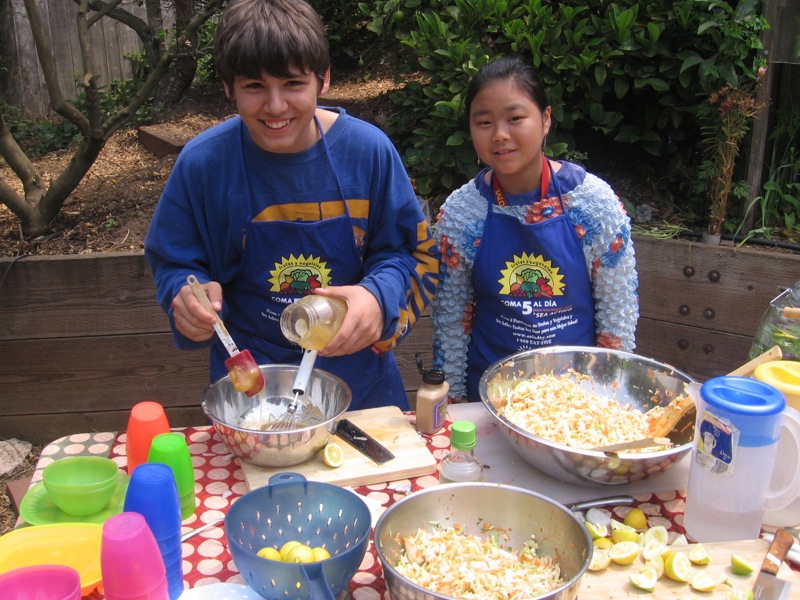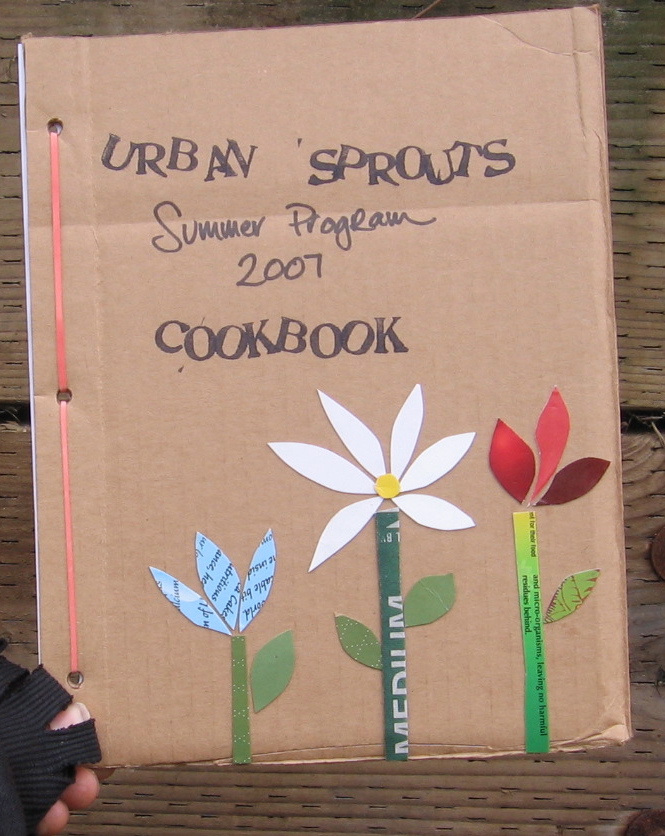If you feel like I do, today’s political attack ads and gloomy financial news on TV have you hungering for meaning. For meaningful conversations about the needs in our families and our communities, and for a meaningful way to make a difference.
 A new era is here: we can no longer depend on cheap food made from fossil fuels. It’s up to us, now, to push this movement over the edge: the movement to make fresh, healthy, and locally-grown food a reality for all of our families and our communities.
A new era is here: we can no longer depend on cheap food made from fossil fuels. It’s up to us, now, to push this movement over the edge: the movement to make fresh, healthy, and locally-grown food a reality for all of our families and our communities.Remember, our youth are our future green farmers. I’d love for you to see the young people in an Urban Sprouts class. In the garden, they are laughing and smiling, reaching into the soil, pulling out bright orange carrots, and munching on them. They are talking: “organic is cool,” and “mmm . . . crunch, crunch“ can be heard as they stop for a break from the hard work of digging.
When worries creep into my mind—high gas and food prices, and the absolute mess of our fossil fuel-gobbling food system—the tranquility of the school garden and the murmur of cheerful young voices always snap me out of it.
 We have SO much work to do! School gardens can transform our nation. School gardens fulfill our youth’s hunger for fresh and healthy food, and for meaningful work that makes their schools and neighborhoods safer, greener, and stronger. School gardens drive the demand for food grown by local farming families right here in our region. In fact, school gardens can help us unlock the big three issues we face: health, dependence on oil, and global warming.
We have SO much work to do! School gardens can transform our nation. School gardens fulfill our youth’s hunger for fresh and healthy food, and for meaningful work that makes their schools and neighborhoods safer, greener, and stronger. School gardens drive the demand for food grown by local farming families right here in our region. In fact, school gardens can help us unlock the big three issues we face: health, dependence on oil, and global warming.That’s why today, I am inviting YOU, right now, to CLICK HERE and give a gift of $35, $50 or $125.
You can make a difference too, with your investment in our youth—the future of a fresh and local food system for our nation.
I’d like to tell you more about how your support for Urban Sprouts will make a real difference for urban youth. Urban Sprouts leads garden-based education classes at public middle and high schools, and in the summer at a local community garden.
 Our school garden programs do more than help youth to eat more vegetables and to take care of the environment. Our school gardens change the way young people feel about themselves and their communities. The school garden nurtures self-esteem and shows young people that they can change the world.
Our school garden programs do more than help youth to eat more vegetables and to take care of the environment. Our school gardens change the way young people feel about themselves and their communities. The school garden nurtures self-esteem and shows young people that they can change the world.Be ready – you will be as moved as I am when you read the words of our city’s own young people, as they make real changes in their lives:
“Eat ‘Food,’ Not too much, Mostly Plants.” I don’t eat so much candy, chips and soda. I try to eat more fruits. I told my mom about a lot of things I learned here, and now she goes to the grocery store and buys more fruits and veggies.
I learned how to use the compost bin and about how everything affects our earth. I want to make sure we reduce, reuse, and recycle. I think that it impacted the middle school youth to do that at home and share with other people, because it impacted me, too.
I am more conscious of the waste I produce, especially petroleum products, and really try hard to reduce and reuse.I want to be eating more greens EVERYDAY, and less sugar. I plan on sharing my knowledge about nutrition with my parents and brother.
Now I eat more healthy things and want to grow a garden in my backyard.
I’m about to plant my own veggies, so I won’t have to shop! (As much.) I plan to teach my family more about soil health, and about nutrition (how our health relates to the world’s health.)
I want to recycle more and compost instead of put it into the landfill.
My recycling habits have changed and I have already started to teach my family and friends.
New research shows that the difference between youth engaged with nature and youth staring at a TV screen is everything we hope for our children: self-confidence, inner strength, leadership, cooperation, and self-control.
Young people will tell you how much Urban Sprouts gave their talents and strengths a chance to shine:
Everyone in the program was touched and learned new things in different ways.
There were so many different activities around the garden so each person could find their strength or something they really enjoy doing (like the pros at shoveling manure and compost!)I liked taking the younger youth on the garden tour because you can tell that they were getting excited and wanted to touch and taste everything, and then you get to see all they learned.
When we went on the field trip, myself and other kids were saying that they weren’t going to milk the goats. By the end I heard them talking about how they never did that before, but they did it anyways because they might never get another chance.
I was proud to see and hear youth sharing stories and their knowledge about the program with their families.
But, not just any school garden program can achieve these inspiring results for youth and communities. You need the right ingredients, or program elements, to achieve change. That’s why Urban Sprouts uses a research-tested program model, or ‘recipe for success.’
As you may know, Urban Sprouts grew out of a doctoral thesis project conducted during the 2003-04 school year. This theory-based research has guided us from the beginning, ensuring our high level of effectiveness.
 Since 2003, over 1,700 youth have benefited from hands-on garden learning by growing, harvesting and eating their own vegetables. We’ve expanded to reach over 750 youth each year at six public schools: Aptos Middle School, Martin Luther King, Jr. Middle School, International Studies Academy, June Jordan School for Equity, San Francisco Community School, and Ida B. Wells Continuation High School. At these schools, over 60% of youth are from low-income families and over 95% are youth of color.
Since 2003, over 1,700 youth have benefited from hands-on garden learning by growing, harvesting and eating their own vegetables. We’ve expanded to reach over 750 youth each year at six public schools: Aptos Middle School, Martin Luther King, Jr. Middle School, International Studies Academy, June Jordan School for Equity, San Francisco Community School, and Ida B. Wells Continuation High School. At these schools, over 60% of youth are from low-income families and over 95% are youth of color.Plus, families in our urban neighborhoods have to walk miles to buy fresh and locally-grown food. San Francisco’s southeast communities have four times more fast food restaurants and liquor stores than they have grocery stores.
That’s why Urban Sprouts has partnered with school families to change the food environment—by bringing fresh, healthy and organic food to youth and their families right at school.
Now, Urban Sprouts supports youth and their families in four ways:
- Garden-based Science class: Over 750 students experience hands-on lessons in environmental science and nutrition, garden work projects, and cooking projects, led by Urban Sprouts’ Garden Educators together with classroom teachers and volunteers.
- Summer Program: Each summer 20 youth enjoy two weeks of intensive gardening, cooking, eating and learning about a healthy food system. At San Francisco’s Garden for the Environment, youth learn skills, prepare a healthy lunch every day, and take home their new learning to help their families eat better and protect the environment.
- Family Programs: Our parent workshops are growing into Internships for school family members: parents will grow their own cultural foods in family plots within school garden sites! Interns receive resources and support to make family food access a reality.
- School Food and Farm Connection: Farm field trips show youth a healthy food system: goats, chickens, and plants work together in natural cycles, and food travels a short distance to reach our plate. Urban Sprouts helps our school partners advocate to bring local and fresh food into school cafeterias, through partnerships at the local, state and regional levels. Our farm-to-school partners show potential results like regional environmental health and state-wide economic growth.
And now, this is where you come in: we need you to help us reach our vision!
CLICK HERE to make an investment in Urban Sprouts today, and help us build a world where all youth and families can enjoy the fresh, organic food and the connection to nature we need to live healthy and fulfilling lives.
Please join us in this meaningful work, by sending your donation today.
Thank you very much.
Sincerely,
Abby R. Jaramillo, abby AT urbansprouts DOT org
Executive Director
P.S. We need you! Along with your gift, we’d love your ideas! You can also bring your company out for a garden volunteer day or serve on our board. Email me and I'd love to talk more!









No comments:
Post a Comment